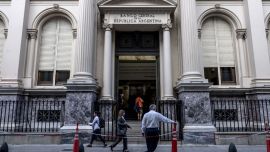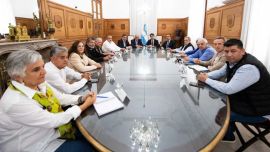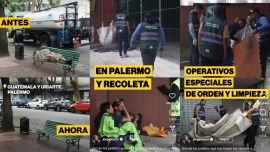BUDGET PITCH
The government punctually submitted the 2019 budget to Congress last Monday (the first working day after the statutory September 15 deadline). The preliminary budget pledges a zero primary fiscal deficit and a dollar ending next year on 40.10 pesos, even if a 2019 inflation of 23 percent is forecast. But the draft budget took a gloomier view of the economy as a whole, projecting a contraction of 0.5 percent (negative growth of -2.4 percent is already predicted for this year). Other key data include total revenues of 3.7 trillion pesos, total spending of just over four trillion and a trade deficit of US$9.9 billion (as against this year’s US$22.4 billion). To offset the image of austerity, Economy Minister Nicolás Dujovne announced that social spending would rise 32.3 percent (presumably not in real terms). Given a minority government in both Houses of Congress, amendments following further negotiations are confidently expected.
PENSIONS RULING
A pensioner cannot collect less than 70 percent of his or her working salary (calculated as an average of the last 10 years of active life), the Federal Social Security Court ruled in midweek. The two judges further ruled that any further updating (including the “historic reparation”) should be on top of the 70 percent. The current pension range is between 45 and 58 percent of the previous salary while the judges pointed out that the minimum pension of 8,636 pesos is only 29 percent of the average wage of almost 30,000 pesos. While the Anses social security administration is expected to appeal, there was no immediate response from the government.
THIS WEEK IN CORRUPTION (SPECIAL BUMPER EDITION)
In a historic 500-page ruling on Monday Federal Judge Claudio Bonadio ordered the trial of former president and current Senator Cristina Fernández de Kirchner on charges of heading a criminal organisation (consisting of her 41 codefendants), also calling for her to be remanded in custody (see Page 7). Oscar Thomas, the former president of Yacyretá hydro-electric dam and the last of those indicted for the “notebooks” Kirchnerite corruption scandal still at large, was arrested in Recoleta apartment on Tuesday, thus ending almost seven weeks on the run. At the start of the week an explosive confession by former Public Works secretary José López emerged to the effect that bags containing some US$9 million, which he so notoriously tossed over a convent wall in mid2016, were ultimately destined for ex-president herself. Meanwhile, Leonardo Fariña – a name which has long been synonymous with corruption during the Kirchner governments – made a series of TV appearances this week, in which the selfconfessed former “delivery boy” of illegally obtained money claimed that he had laundered some US$77 million for Kirchnerite business ally Lázaro Báez and that cash was hidden in the grounds of estancias across the country. Elsewhere (but yes, still related), actress Andrea del Boca (once Argentina’s version of Shirley Temple) was sent to trial on Thursday for her role in the alleged fraud scandal revolving around the film Mama Corazón, which granted a lavish 24-million-peso Federal Planning Ministry budget to be shot entirely in the province of Santa Cruz. It never screened. As seems to be the custom in all things involving the ministry he formerly headed, ex-planning minister Julio De Vido was also indicted.
G20 COUNTDOWN
The G20 calendar continues its countdown with the main summit of world leaders now only two months away. The T20 (i.e. the think tanks of the globe’s leading economies) thrashed out a whole raft of issues this week in this city – important enough to draw the presence of President Mauricio Macri, Cabinet Chief Marcos Peña and Economy Minister Nicolás Dujovne among others. And at the end of last week the G20 trade ministers huddled in the Atlantic resort of Mar del Plata. Their closing statement highlighted the value of dialogue but there was no visible sign that they had tackled the trade tensions emanating from US President Donald Trump’s protectionism.
CITY’S PRICE OF POVERTY
A family of four in the City of Buenos Aires needed to earn 20,937.90 pesos last month to stay above the poverty line and cover the costs of the family shopping-basket, which rose 3.5 percent in August, according to City Hall statistics. To avoid destitution the figure would be 10,252.48 pesos.
PROTEST DETENTIONS
Juan Grabois, the Kirchnerite picket leader closely linked to Pope Francis, was arrested on Tuesday at a protest in Constitución on behalf of Senegalese peddlers but released the same evening. However he remained in the 18th police precinct until the others also arrested (including 10 MTE and CTEP social activists along with three Senegalese immigrants) had been freed in the small hours of Wednesday. Grabois condemned his arrest as “arbitrary” and “politically discriminatory,” a complaint echoed by Kirchnerite leaders.
NEGATIVE ECONOMIC INDICATORS
INDEC sposted the most negative growth figures in a decade last Wednesday, due to the double whammy of summer drought and autumn currency crisis continuing into winter. At midyear the economy had contracted 4.2 percent from the second quarter of last year – the worst such figure since 2012 – while the shrinkage so far this year totals four percent, the worst in a decade, according to INDEC. The economy is thus effectively back to where it started under the Mauricio Macri presidency at the end of 2015. Private economists were quick to blame agriculture, which slumped 31.6 percent, but other sectors were also down, if far less dramatically, while the construction boom slowed down to 5.5 percent growth. Nor was there good news for the balance of trade with exports 7.5 percent down and imports 2.7 percent up between the two midyears. Meanwhile, unemployment is up to 9.6 percent, another warning sign.
‘SUPER TUESDAY’
There was a brief respite from long months of financial turbulence last week when the Central Bank weathered the ‘Super Tuesday’ redemption of some 230 billion pesos worth of Lebac bonds without the proceeds immediately flooding in midweek to the already overstretched dollar market to weaken the peso yet further. Instead the dollar actually dipped one percent the next day (even though Central Bank intervention only totalled US$ 195 million) country risk fell from 656 to 622 points and Argentine shares on Wall Street rose in a 3.5-16.7 percent range.






















Comments